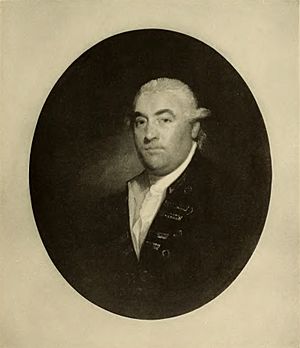William Hotham, 1st Baron Hotham facts for kids
Quick facts for kids
William Hotham, 1st Baron Hotham
|
|
|---|---|

portrait by Gilbert Stuart
|
|
| Born | 1736 |
| Died | 1813 |
| Allegiance | |
| Service/ |
|
| Rank | Admiral |
| Commands held | Mediterranean Fleet |
| Battles/wars | American Revolutionary War French Revolutionary Wars |
Admiral William Hotham, 1st Baron Hotham (1736–1813) was an important officer in the Royal Navy, which is the British navy. He came from a well-known family.
Contents
William Hotham went to Westminster School and the Royal Naval Academy in Portsmouth. He joined the navy in 1751 when he was about 15 years old. He spent his early years as a midshipman in America.
Early Commands
In 1755, Hotham became a lieutenant on Admiral Edward Hawke's ship, the St George. Soon after, he was given his first small command. This led to him getting more important roles over time.
While commanding the ship Syren, he fought a tough battle against a stronger French ship called Telemaque. Later, on the smaller ship Fortune, he bravely captured a privateer (a private ship allowed to attack enemy ships) that had 26 guns. Because of his bravery, he was given a more powerful ship.
Fighting in Frigates
From 1757, Hotham commanded different frigates, which are fast warships. In 1759, his ship Melampe, along with Southampton, fought two enemy frigates. They managed to capture one of them.
In 1761, the Melampe joined Augustus Keppel's group of ships. However, Hotham's ship often worked alone and captured many enemy vessels.
Service in America
In 1776, Hotham became a Commodore, which is a senior naval rank. He served in North America during the American Revolutionary War. He played a big part in the Battle of St. Lucia on December 15, 1778.
He stayed in America until 1781. Then, he was sent back to England, leading a large group of merchant ships. Near Scilly, Hotham met a strong French group of warships. He could not stop them, and many of the merchant ships were captured by the French.
Later Career and Admiral Rank
In 1782, Commodore Hotham was with Richard Howe when they helped the British base at Gibraltar. In 1790, he became a Rear-admiral of the red. By 1791, he was made a vice admiral. He raised his flag on HMS Britannia that year.
Commander in the Mediterranean
From August 1793, Hotham was the second-in-command to Lord Hood in the Mediterranean Sea. They were fighting against the French navy during the French Revolution. When Lord Hood went back to England, Hotham took over command of the Mediterranean Fleet.
On March 13, 1795, he fought a naval battle near Genoa. The battle did not have a clear winner. Much of the fighting was done by Captain Horatio Nelson. A few months later, Hotham, now a full admiral, fought another French fleet at the Naval Battle of Hyères Islands on July 13, 1795. Nelson later called this battle a "miserable action," suggesting it could have been a bigger victory.
Retirement and Legacy
In November 1795, Admiral Jervis took over from Hotham as the commander of the Mediterranean Fleet. Hotham then returned to England. In 1797, he was given the title of Baron Hotham of South Dalton, which made him a peer in Ireland.
William Hotham passed away in 1813. He was known as a brave and capable officer, even if he wasn't as famous as some other admirals like Nelson.
Since William Hotham did not marry or have children, his title passed to his brother, Sir Beaumont Hotham (1737–1814). The Hotham family continued to have members serve in important roles, including in the military and in government.
 | Toni Morrison |
 | Barack Obama |
 | Martin Luther King Jr. |
 | Ralph Bunche |

